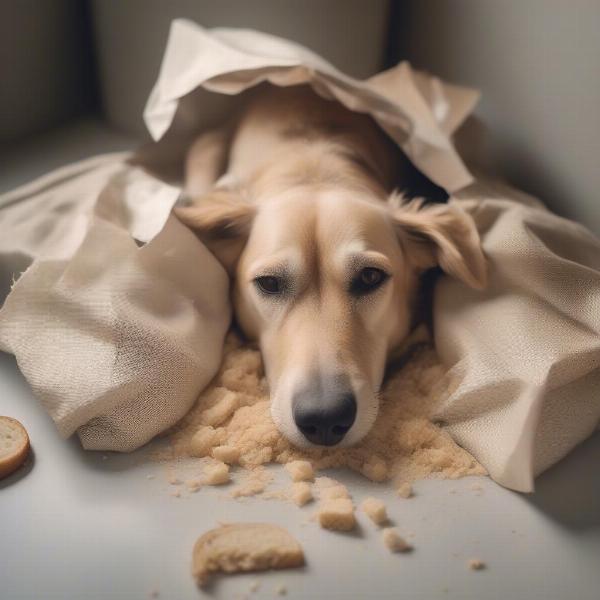If your dog ate a loaf of bread, you’re likely worried. While bread itself isn’t typically toxic to dogs, the sheer quantity can cause digestive upset. This article covers what to expect, potential problems, and when to seek veterinary care. We’ll guide you through handling this common canine culinary escapade, offering practical advice and peace of mind.
Understanding the Risks When Your Dog Eats a Loaf of Bread
Plain white or wheat bread might not be toxic, but large amounts can lead to problems. A dog’s digestive system isn’t designed to handle a sudden influx of carbohydrates. This can cause gas, bloating, and potentially, a painful condition called gastric dilatation-volvulus (GDV), especially in larger breeds. Additionally, some breads contain ingredients that are harmful to dogs, such as raisins, xylitol, or excessive amounts of salt. The size and breed of your dog also play a role in how they react. A small dog eating a whole loaf of bread will be more affected than a larger dog.
 Dog Eating a Loaf of Bread
Dog Eating a Loaf of Bread
What to Expect After Your Dog Eats Bread
If your dog devoured a loaf of bread, the most common symptoms are vomiting, diarrhea, gas, and lethargy. They might also seem uncomfortable and restless due to bloating. In more severe cases, GDV can occur, requiring immediate veterinary intervention. GDV is life-threatening and characterized by a distended abdomen, retching without vomiting, and restlessness.
What to Do If Your Dog Ate a Loaf of Bread
First, assess the situation. What kind of bread was it? How much did they eat? How big is your dog? If the bread contained harmful ingredients like raisins or xylitol, contact your veterinarian immediately. If it was plain bread, monitor your dog closely. Smaller dogs and those with pre-existing health conditions are more susceptible to complications. If you notice excessive bloating, vomiting, diarrhea, or any signs of distress, seek veterinary advice without delay.
When to Contact Your Veterinarian
Don’t hesitate to contact your vet if your dog exhibits any of the following:
- Persistent vomiting or diarrhea
- Severe bloating or abdominal pain
- Lethargy or weakness
- Difficulty breathing
- Pale gums
Your veterinarian may induce vomiting or administer medication to alleviate symptoms. Early intervention is crucial, especially for GDV.
Preventing Future Bread Binges
Keep bread and other baked goods out of your dog’s reach. Secure pantries and countertops. Train your dog basic obedience commands like “leave it” to deter them from snatching unattended food. Ensure all family members understand the importance of not feeding the dog table scraps, especially bread.
What if My Dog Ate Raisin Bread?
Raisins are highly toxic to dogs and can cause kidney failure. If your dog ate raisin bread, contact your veterinarian immediately. Even a small amount of raisins can be dangerous. Time is of the essence in these cases.
Conclusion
While a single slice of bread is unlikely to cause significant harm, a whole loaf can create digestive issues for your dog. Knowing the potential risks and monitoring your dog closely is crucial. If you’re concerned, contact your veterinarian. Prevention is always the best approach, so keep bread and other potentially harmful foods securely stored away from your furry friend.
FAQ
- My dog ate a whole loaf of bread; will he be okay? It depends on the type of bread, the size of your dog, and individual sensitivities. Monitor closely and contact your vet if you see any concerning symptoms.
- Can dogs eat bread dough? No, bread dough is dangerous for dogs as it can expand in their stomach and cause bloating or alcohol poisoning.
- What are the signs of GDV? Bloated abdomen, retching without vomiting, restlessness, and pain.
- How can I prevent my dog from eating bread? Store bread and other baked goods securely out of reach and train your dog with commands like “leave it.”
- My dog ate bread a few hours ago and seems fine, should I still be worried? Continue to monitor your dog for any changes in behavior or digestive issues. If in doubt, contact your veterinarian.
- My dog ate moldy bread, what should I do? Moldy bread can be toxic. Contact your veterinarian immediately.
- Can I give my dog medication for an upset stomach without consulting a vet? No, it’s always best to consult with your veterinarian before giving any medication to your dog.
Related Articles:
About ILM Dog
ILM Dog is your trusted international resource for expert dog care advice. We provide practical and reliable information on dog breeds, health, training, nutrition, grooming, and more. From puppy care to senior dog support, we cover every aspect of dog ownership. ILM Dog connects you with a wealth of knowledge to help you provide the best possible care for your canine companion. Contact us at [email protected] or +44 20-3965-8624 for personalized guidance.